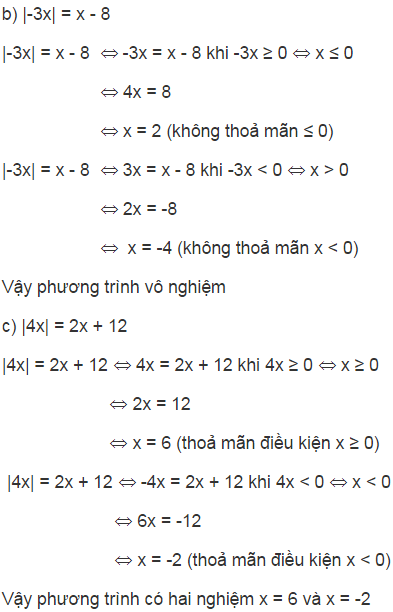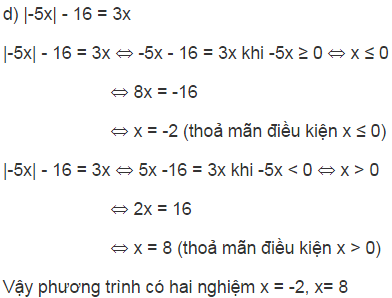
Hãy nhập câu hỏi của bạn vào đây, nếu là tài khoản VIP, bạn sẽ được ưu tiên trả lời.


a) 7x - 35 = 0
<=> 7x = 0 + 35
<=> 7x = 35
<=> x = 5
b) 4x - x - 18 = 0
<=> 3x - 18 = 0
<=> 3x = 0 + 18
<=> 3x = 18
<=> x = 5
c) x - 6 = 8 - x
<=> x - 6 + x = 8
<=> 2x - 6 = 8
<=> 2x = 8 + 6
<=> 2x = 14
<=> x = 7
d) 48 - 5x = 39 - 2x
<=> 48 - 5x + 2x = 39
<=> 48 - 3x = 39
<=> -3x = 39 - 48
<=> -3x = -9
<=> x = 3

Cái bài đầu giải BPT bn ghi cái dj ak ,mik cx k hỉu nữa
V mik giải bài 2 nghen, sửa lại đề bài đầu rồi mik giải cho
\(3x-3=|2x+1|\)
Điều kiện: \(3x-3\ge0\Leftrightarrow3x\ge3\Leftrightarrow x\ge1\)
\(\Leftrightarrow\orbr{\begin{cases}2x+1=3x-3\\2x+1=-3x+3\end{cases}}\)
\(\Leftrightarrow\orbr{\begin{cases}2x-3x=-1-3\\2x+3x=-1+3\end{cases}}\)
\(\Leftrightarrow\orbr{\begin{cases}-x=-3\\5x=2\end{cases}\Leftrightarrow\orbr{\begin{cases}x=3\left(n\right)\\x=\frac{2}{5}\left(l\right)\end{cases}}}\)
Vậy S={3}
Cài đề câu b ,bn xem lại nhé!
\(\frac{2x-3}{35}+\frac{x\left(x-2\right)}{7}>\frac{x^2}{7}-\frac{2x-3}{5}\)
\(\Leftrightarrow\frac{2x-3}{35}+\frac{5x\left(x-2\right)}{35}-\frac{5x^2}{35}+\frac{7\left(2x-3\right)}{35}>0\)
\(\Leftrightarrow2x-3+5x\left(x-2\right)-5x^2+7\left(2x-3\right)>0\)
\(\Leftrightarrow2x-3+5x^2-10x-5x^2+14x-21>0\)
\(\Leftrightarrow6x-24>0\)
\(\Leftrightarrow x>4\)
VẬY TẬP NGHIỆM CỦA BẤT PHƯƠNG TRÌNH LÀ : S = { \(x\text{\x}>4\)}
\(\frac{6x+1}{18}+\frac{x+3}{12}\le\frac{5x+3}{6}+\frac{12-5x}{9}\)
\(\Leftrightarrow\frac{6\left(6x+1\right)}{108}+\frac{9\left(x+3\right)}{108}\le\frac{18\left(5x+3\right)}{108}+\frac{12\left(12-5x\right)}{108}\)
\(\Leftrightarrow36x+6+9x+27\le90x+54+144-60x\)
\(\Leftrightarrow36x+6+9x+27-90x-54-144+60x\le0\)
\(\Leftrightarrow15x-165\le0\)
\(\Leftrightarrow x\le11\)
VẬY TẬP NGHIỆM CỦA BẤT PHƯƠNG trình ..........
tk mk nka !!! chúc bạn học tốt !!!

Bạn đăng từng câu một thì sẽ có người giúp bạn đấy!
Tick cho mình nhé!

|2x| = x - 6
|2x| = x - 6 ⇔ 2x = x - 6 khi x ≥ 0 ⇔ x = -6 loại vì không thoả mãn x ≥ 0
|2x| = x - 6 ⇔ -2x = x - 6 khi x < 0 ⇔ 3x = 6 ⇔ x = 2 loại vì không thoả mãn x < 0
Vậy phương trình vô nghiệm.

a, \(1-\frac{2x-1}{9}=3-\frac{3x-3}{12}\)
\(\Leftrightarrow\frac{108-12\cdot\left(2x-1\right)}{108}=\frac{108\cdot3-9\cdot\left(3x-3\right)}{108}\)
\(\Rightarrow108-12\cdot\left(x-1\right)=108\cdot3-9\cdot\left(3x-3\right)\)
\(\Leftrightarrow108-24x+12=324-27x+27\)
\(\Leftrightarrow3x=231\)
\(\Rightarrow x=77\)
c,\(\frac{3}{4x-20}+\frac{15}{50-2x^2}+\frac{7}{6x+30}=0\)
\(\Rightarrow3\cdot\left(50-2x^2\right)\cdot\left(6x+30\right)+15\cdot\left(4x-20\right)\cdot\left(6x+30\right)+7\cdot\left(4x-20\right)\cdot\left(50-2x^2\right)=0\)
\(\Leftrightarrow900x+4500-36x^3-180x^2+360x^2+1800x-1800x-9000+1400x-56x^3-7000+280x^2=0\)
\(\Leftrightarrow-92x^3+460x^2+2300x-11500=0\)
\(\Leftrightarrow92x^3-460x^2-2300x+11500=0\)
\(\Leftrightarrow\orbr{\begin{cases}x=-5\\x=5\end{cases}}\)
a) Thay x = 3 vào bất phương trình ta được: 2.3 + 3 < 9 <=> 9 < 9 (khẳng định sai)
Vậy x = 3 không là nghiệm của bất phương trình2x + 3 < 9
b) Thay x = 3 vào bất phương trình ta có: -4.3 > 2.3 + 5 => -12 > 11 (khẳng định sai)
Vậy x = 3 không là nghiệm của bất phương trình -4x > 2x + 5
c) Thay x = 3 vào bất phương trình ta có: 5 - 3 > 3.3 -12 => 2 > -3 (khẳng định đúng)
Vậy x = 3 là nghiệm của bất phương trình 5 - x > 3x - 12

a: \(\Leftrightarrow\left\{{}\begin{matrix}x< =\dfrac{3}{2}\\\left(\dfrac{1}{2}x\right)^2-\left(2x-3\right)^2=0\end{matrix}\right.\Leftrightarrow\left\{{}\begin{matrix}x< =\dfrac{3}{2}\\\left(\dfrac{1}{2}x-2x+3\right)\left(\dfrac{1}{2}x+2x-3\right)=0\end{matrix}\right.\)
\(\Leftrightarrow\left\{{}\begin{matrix}x< =\dfrac{3}{2}\\\left(3-\dfrac{3}{2}x\right)\left(\dfrac{5}{2}x-3\right)=0\end{matrix}\right.\Leftrightarrow x\in\left\{\dfrac{6}{5}\right\}\)
b: \(\Leftrightarrow\left\{{}\begin{matrix}x>=-\dfrac{4}{3}\\\left(3x+4\right)^2-\left(2x\right)^2=0\end{matrix}\right.\Leftrightarrow\left\{{}\begin{matrix}x>=-\dfrac{4}{3}\\\left(5x+4\right)\left(x+4\right)=0\end{matrix}\right.\)
\(\Leftrightarrow x=-\dfrac{4}{5}\)
c: \(\Leftrightarrow\left\{{}\begin{matrix}x>=12\\\left(5x-x+12\right)\left(5x+x-12\right)=0\end{matrix}\right.\Leftrightarrow\left\{{}\begin{matrix}x>=12\\\left(4x+12\right)\left(6x-12\right)=0\end{matrix}\right.\)
hay \(x\in\varnothing\)
d: \(\Leftrightarrow\left\{{}\begin{matrix}x>=-\dfrac{10}{3}\\\left(2,5x-1,5x-5\right)\left(2,5x+1,5x+5\right)=0\end{matrix}\right.\)
\(\Leftrightarrow\left\{{}\begin{matrix}x>=-\dfrac{10}{3}\\\left(x-5\right)\left(4x+5\right)=0\end{matrix}\right.\Leftrightarrow x\in\left\{-\dfrac{5}{4};5\right\}\)

\(a.\Leftrightarrow\frac{5x^2+16}{\left(x+4\right)\left(x-4\right)}=\frac{\left(2x-1\right)\left(x-4\right)+\left(3x-1\right)\left(x+4\right)}{\left(x+4\right)\left(x-4\right)}DKXD:x\ne4;-4\)
\(\Rightarrow5x^2+16=2x^2-8x-x+4+3x^2+12x-x-4\)
\(\Leftrightarrow2x=16\)
\(\Leftrightarrow x=8\)
\(b.\Leftrightarrow\frac{\left(y+1\right)\left(y+2\right)-5\left(y-2\right)}{\left(y-2\right)\left(y+2\right)}=\frac{12+\left(y-2\right)\left(y+2\right)}{\left(y-2\right)\left(y+2\right)}.DKXD:y\ne2;-2\)
\(\Rightarrow y^2+2y+y+2-5y+10=12+y^2-4\)
\(\Leftrightarrow-2y=-4\)
\(\Leftrightarrow y=2\)
Giải các phương trình:
\(a,\left(x^2-5x\right)^2+10\left(x^2-5x\right)+24=0\)
\(b,x^4-30x^2+31x-30=0\)

a, Đặt \(x^2-5x=a\)
\(\Rightarrow\)\(a^2+10a+24=0\)
\(\Rightarrow a^2+4a+6a+24=0\)
\(\Rightarrow\left(a+4\right)\left(a+6\right)=0\)
\(\Rightarrow\orbr{\begin{cases}a+4=0\\a+6=0\end{cases}\Rightarrow\orbr{\begin{cases}x^2-5x+4=0\left(1\right)\\x^2-5x+6=0\left(2\right)\end{cases}}}\)
Giải pt (1) ta có : \(x^2-5x+4=0\)
\(\Rightarrow x^2-4x-x+4=0\)
\(\Rightarrow\left(x-4\right)\left(x-1\right)=0\)
\(\Rightarrow\orbr{\begin{cases}x=1\\x=4\end{cases}}\)
Giải pt (2) ta có : \(x^2-5x+6=0\)
\(\Rightarrow x^2-2x-3x+6=0\)
\(\Rightarrow\left(x-2\right)\left(x-3\right)=0\)
\(\Rightarrow\orbr{\begin{cases}x=2\\x=3\end{cases}}\)
Vậy \(S=\left\{1;2;3;4\right\}\)
\(x^4-30x^2+31x-30=0\)
\(\Rightarrow x^4-30x^2+x+30x-30=0\)
\(\Rightarrow\left(x^4+x\right)-\left(30x^2-30x+30\right)=0\)
\(\Rightarrow x\left(x^3+1\right)-30\left(x^2-x+1\right)\)
\(\Rightarrow x\left(x+1\right)\left(x^2-x+1\right)-30\left(x^2-x+1\right)\)
\(\Rightarrow\left(x^2-x+1\right)\left(x^2+x-30\right)=0\)
Mà \(x^2-x+1>0\)với \(\forall\)\(x\)
\(\Rightarrow x^2+x-30=0\)
\(\Rightarrow x^2-5x+6x-30=0\)
\(\Rightarrow x\left(x-5\right)+6\left(x-5\right)=0\)
\(\Rightarrow\left(x-5\right)\left(x+6\right)=0\)
\(\Rightarrow\orbr{\begin{cases}x=5\\x=-6\end{cases}}\)
Vậy \(S=\left\{5;-6\right\}\)




Ta có: |5x| = 5x khi 5x ≥ 0 ⇔ x ≥ 0
|5x| = -5x khi 5x < 0 ⇔ x < 0
Ta có: 5x = x – 12 ⇔ 5x – x = -12 ⇔ 4x = -12 ⇔ x = -3
Giá trị x = -3 không thỏa mãn điều kiện x ≥ 0 nên loại.
-5x = x – 12 ⇔ -5x – x = -12 ⇔ -6x = -12 ⇔ x = 2
Giá trị x = 2 không thỏa mãn điều kiện x < 0 nên loại.
Vậy phương trình vô nghiệm. Tập nghiệm là S = ∅